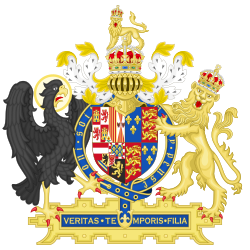| First Fruits and Tenths Act 1534 | |
|---|---|
| Act of Parliament | |
 | |
| Long title | An Act concerning the Payments of First-fruits of all Dignities, Benefices and Promotions Spiritual; and also concerning one annual Pension of the tenth Part of all the Possessions of the Church, Spiritual and Temporal, granted to the King's Highness and his Heirs. |
| Citation | 26 Hen. 8. c. 3 |
| Territorial extent | England and Wales |
| Dates | |
| Royal assent | 18 December 1534 |
| Commencement | 3 November 1534 [a] |
| Repealed | 15 July 1926 |
| Other legislation | |
| Amended by | |
| Repealed by | First Fruits and Tenths Measure 1926 |
| Relates to | First Fruits and Tenths (No. 2) Act 1534 |
Status: Repealed | |
| Text of statute as originally enacted | |
| First Fruits and Tenths (No. 2) Act 1534 | |
|---|---|
| Act of Parliament | |
 | |
| Long title | An Act that no Farmers of Spiritual Persons shall be compelled or charged to pay for their Leaser's First Fruits, or Year's Pension of the Tenth, granted to the King's Highness. |
| Citation | 26 Hen. 8. c. 17 |
| Territorial extent | England and Wales |
| Dates | |
| Royal assent | 18 December 1534 |
| Commencement | 3 November 1534 [a] |
| Repealed | 15 July 1926 |
| Other legislation | |
| Repealed by | First Fruits and Tenths Measure 1926 |
| Relates to | |
Status: Repealed | |
| Text of statute as originally enacted | |
| First Fruits and Tenths Act 1535 | |
|---|---|
| Act of Parliament | |
 | |
| Long title | An Act for Discharge of Payment of the Tenth in that Year in which they pay their First Fruits. |
| Citation | 27 Hen. 8. c. 8 |
| Territorial extent | England and Wales |
| Dates | |
| Royal assent | 14 April 1536 |
| Commencement | 1 May 1536 [b] |
| Repealed | 15 July 1926 |
| Other legislation | |
| Amends | First Fruits and Tenths Act 1534 |
| Repealed by | First Fruits and Tenths Measure 1926 |
| Relates to | |
Status: Repealed | |
| Text of statute as originally enacted | |
| First Fruits, etc. Act 1555 | |
|---|---|
| Act of Parliament | |
 | |
| Long title | An Act for the Extinguishment of the First Fruits, and touching Order and Disposition of the Tenths of Spiritual and Ecclesiastical Promotions, and of Rectories and Parsonages Impropriate, remaining in the Queen's Majesty's Hands. |
| Citation | 2 & 3 Ph. & M. c. 4 |
| Territorial extent | England and Wales |
| Dates | |
| Royal assent | 9 December 1555 |
| Commencement | 21 October 1555 [a] |
| Repealed | 23 January 1559 |
| Other legislation | |
| Amends | First Fruits and Tenths Act 1534 |
| Repealed by | First Fruits and Tenths Act 1558 |
| Relates to | |
Status: Repealed | |
| Text of statute as originally enacted | |
| First Fruits and Tenths Act 1558 | |
|---|---|
| Act of Parliament | |
 | |
| Long title | An Act for the Restitution of the First Fruits, and Tenths and Rents reserved Nomine Decime, and of Parsonages Impropriate, to the Imperial Crown of this Realm. |
| Citation | 1 Eliz. 1. c. 4 |
| Territorial extent | England and Wales |
| Dates | |
| Royal assent | 8 May 1559 |
| Commencement | 23 January 1559 [a] |
| Repealed | 30 July 1948 |
| Other legislation | |
| Amends | |
| Repeals/revokes | First Fruits, etc. Act 1555 |
| Repealed by | Statute Law Revision Act 1948 |
Status: Repealed | |
| Text of statute as originally enacted | |
First Fruits and Tenths was a form of tax on clergy taking up a benefice or ecclesiastical position in Great Britain. The Court of First Fruits and Tenths was established in 1540 to collect from clerical benefices certain moneys that had previously been sent to Rome.
Contents
Clergy had to pay a portion of their first year's income (known as annates) [1] and a tenth of their revenue annually thereafter. Originally, the money was paid to the papacy, but Henry VIII's 1534 statute diverted the money to the English Crown as part of his campaign to pressure the Pope into granting him an annulment of his marriage with Catherine of Aragon.
The Appointment of Bishops Act 1533 (25 Hen. 8. c. 20) allowed taxes on first fruits and tenths (of benefice’s income) to be transferred from the Pope to the King. Thomas Cromwell set up a special financial administration for these revenues. Following his removal from office, a separate administration was established: the Court of First Fruits and Tenths. In 1554 the court was dissolved, and responsibility for administration of these revenues passed to the Office of First Fruits and Tenths, a department of the Exchequer. During the 18th century, these payments formed the basis of Queen Anne's Bounty.